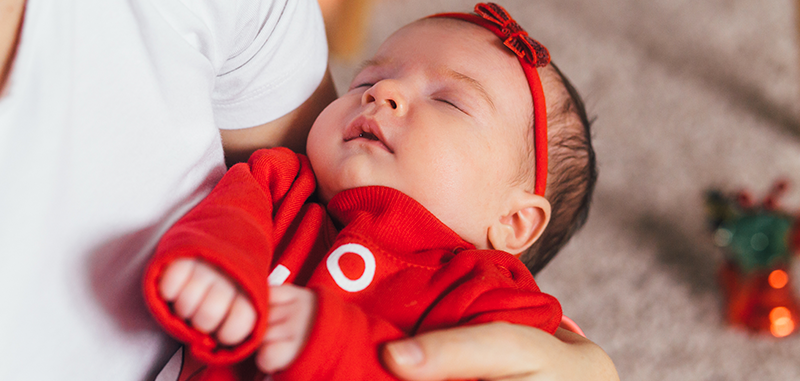When do babies sleep through the night ? Tips and tricks !

"When do babies sleep through the night?"
It's a question that weighs heavily on the minds of many new parents. Between constant night wakings, overwhelming exhaustion, and comparisons with other babies who seem to sleep for hours uninterrupted, the anxiety can build quickly. If you're tired and wondering when peaceful nights will finally begin, you're not alone.
In this article, we’ll not only answer the big question — when do babies sleep through the night — but also offer reassurance: every baby develops at their own pace.
👉 Some little ones manage to sleep 6 hours straight by 4 months, while others may not sleep through the night until 9 months or even later. That’s completely normal. Sleep depends on many factors, including physical development, environment, and even your baby’s personality.
We’ll walk you through what “sleeping through the night” really means, the key factors that influence your baby’s sleep, and most importantly, how you can support them through this essential stage. Just like walking or talking, sleep is a skill your baby needs to learn — and there are gentle, effective ways to help them get there.
Here, you’ll find evidence-based answers and practical advice to help you reclaim your nights. Patience and understanding are your best allies during this delicate phase, and we’re here to support you every step of the way.
When do babies sleep through the night?
Unfortunately, there’s no one-size-fits-all answer. Every baby is different, and the age at which they begin sleeping for longer stretches can vary widely.
It really depends on the baby:
Some parents find that their baby starts sleeping 6 hours at a stretch by 4 months, while others may need to wait until their child is 6 or even 9 months old before getting more restful nights.
On average, here’s what studies and parents' experiences suggest:
- Only 1 in 5 babies sleeps through the night by the age of 2 months
- 2 in 5 babies sleep through the night starting at 4 months
- 3 in 5 babies manage to sleep through by around 6 months
- 4 in 5 babies sleep through the night by the time they’re 12 months old
Here’s what they found:
🟠 30% of 6-month-old babies (and 28% of 12-month-olds) were not sleeping 6 hours in a row
🟠 57% of 6-month-old babies (and 43% of 12-month-olds) were not sleeping 8 hours straight
Another Canadian study ("Sleep and sleep ecology in the first 3 years: a web-based study" by Sadeh, A. et al. – 2019) gathered responses from 5,000 parents about their babies’ sleep quality.
When it comes to night wakings, the average findings were as follows:
- 2 night wakings on average for babies under 2 months
- 1.25 night wakings for babies aged 3 to 11 months
- 0.82 night wakings for children between 1 and 3 years old
🤱 So don’t worry if your little one isn’t sleeping through the night by 4 months — that’s completely normal!

What does “sleeping through the night” really mean?
When people talk about a baby who “sleeps through the night,” many parents imagine uninterrupted sleep from bedtime until morning. Unfortunately, the reality is quite different — especially with newborns.
Sleeping through the night doesn’t mean your baby is getting 10 or 12 hours of solid sleep. It usually means they’re able to sleep between 6 and 8 hours in a row without needing to feed or be comforted.
👉 A definition that might surprise you!
For a baby, sleeping 6 hours straight is already a huge milestone! For example, if your little one falls asleep at 8 p.m., waking up around 3 or 4 a.m. is entirely normal. That may not sound like a “full night” to a tired parent — but it’s exactly what experts mean when they say a baby is “sleeping through the night.”
Why does it seem like so little?
Many new parents expect their baby to sleep all the way through the night without waking. That’s totally understandable — the exhaustion, the repeated night wakings, and the need for true rest are very real. But for a young infant, being able to stay asleep for several hours in a row is already a big achievement.
What to remember:
- Sleeping through the night for a baby = 6 to 8 hours of uninterrupted sleep.
- Your baby may go to bed at 8 p.m. and wake up at 4 a.m. — and that still counts as “sleeping through the night.”
- Parents’ expectations are often higher than the biological reality of a baby’s natural sleep cycle.
Why do some babies sleep through the night earlier than others?
As a parent, it’s only natural to wonder why your baby isn’t sleeping through the night yet — especially when you hear about other infants sleeping 8 hours straight just a few months in.
But it’s important to remember that every baby is different. Comparing your little one to a neighbor’s or cousin’s baby who seems to be sleeping better can lead to unnecessary stress. Sleep development varies greatly from one child to another, and it’s not a sign of delay or a problem.
Here are the top 3 reasons why some babies take longer to sleep through the night.
First, your baby needs to be able to store enough energy to go without feeding for about 6 hours. This is often possible once they reach a weight of around 11 pounds (5 kg). Before that point, their nutritional needs are simply too frequent for long stretches of sleep.
In addition, your baby needs time to regulate their internal systems — adjusting their circadian rhythm (day/night cycles), body temperature, and cardiovascular functions. These biological processes require gradual development as your baby matures.
So if your baby isn’t sleeping through the night at 3 months old, it may simply be because their body isn’t quite ready yet — and that’s perfectly normal!
If one of the parents has a history of sleep disorders such as sleepwalking or night terrors, there’s a good chance your baby might inherit a similar tendency. This may explain why some babies take longer to sleep through the night than others.
In addition, certain genes appear to influence sleep quality starting around 6 months of age. In other words, some babies are simply more genetically “wired” to sleep deeply and for longer stretches... and some are not!
So if your baby isn’t yet sleeping through the night, it might just be that their genes gave them a little head start — or a slight delay. But don’t worry: with time, patience, and a nurturing approach, healthy sleep habits can still develop. After all, we can’t control everything... though we all wish we could have chosen the “good sleeper” genes, right?
If your little one is struggling to sleep through the night, certain habits or environmental factors could be getting in the way. For example, an inconsistent bedtime routine can disrupt their internal rhythm. Similarly, if there isn’t a clear contrast between day and night — too much light in the evening, or a room that’s too dark during the day — your baby might have trouble understanding that nighttime is for sleeping. Naps that are too late or too long can also throw off their sleep cycle.
The goal isn’t to turn your home into a sleep monastery, but rather to create a calm and consistent environment that helps your baby distinguish different parts of the day. With a bit of structure and a few simple changes, you can guide your little one toward a more stable rhythm… and hopefully help them sleep through the night soon!
How can you help your baby sleep through the night?
There’s no such thing as a “good baby” who sleeps all night and a “bad baby” who refuses to.
Sleep is, above all, a learned skill.
And yet, this idea isn’t widely understood! Ask a parent why their 2-year-old still wears diapers, and they’ll likely tell you the child is “learning” to use the toilet. But ask the same parent whether their younger baby sleeps through the night, and the answer might simply be: “no.” The truth is, sleep is not a matter of luck — it’s a learning process!
Learning to sleep well doesn’t happen on its own. Your baby needs your help to get there.
Starting around 4 to 5 months, your little one needs you to create an environment that supports sleep. There are countless articles online promising miracle sleep solutions — a certain light, a specific sound, or a magical bedtime routine. But this approach often misses the point.
The goal isn’t just to get your baby to sleep — it’s to teach them how to fall asleep on their own. So let’s take a look at some key steps you can take to support your baby’s natural sleep development and guide them gently toward the moment when babies sleep through the night.
BEFORE 5 MONTHS:
There are some well-known signs — like yawning, rubbing their eyes, or a drop in body temperature.
But every baby is different, and yours may show more subtle cues: pulling at their ear, getting overly excited, or fussing just a little. All of these are signals that it’s time for sleep — and your baby should be put to bed without delay!
Your arms — or anything other than their own sleep signals — could become essential for them to fall asleep. This can lead to your baby waking up as soon as they’re placed in the crib, or struggling to fall back asleep if they wake during the night and you’re not there!
🌜 During nighttime wake-ups, try to keep noise to a minimum and dim the lights during feedings, whether bottle or breast. You can whisper softly, slow down your movements, and keep things calm and quiet.
🌞 During the day, do the opposite — stimulate your baby by getting outside or letting natural light fill the house and their room.
Important: Of course, never wake your baby just because it’s daytime. They still need plenty of sleep!
Watch out for what’s called “active sleep”: Before 4 months old, babies alternate between two phases of sleep: “quiet sleep” and “active sleep.”
During active sleep, unlike in deep restful sleep, your baby may start to move. They might stretch, grunt, turn red, or yawn. Their face may change color, and you might notice their eyes moving under closed — or even slightly open — eyelids.
This sleep phase is much lighter and often includes brief micro-awakenings that last just a few seconds or up to a minute.
Even if they look awake, your baby is still asleep! That’s why it’s so important not to interrupt this stage. Many new parents misinterpret active sleep as restlessness or a full wake-up.
So be patient and wait a few moments to see if your baby settles back into sleep before assuming they’re awake!
AFTER 4–5 MONTHS:
After 4 months, once you’ve identified the signs that your little one is ready for sleep, try to stick to a consistent bedtime! By doing this (without being too strict), you help them create clear time-based cues.
With patience, this will help your baby better understand their world and what’s expected of them. This brings a strong feeling of security — and marks an important step in developing healthy sleep habits.
Watch out for disruptions: Sleep learning often begins around 4 months, but at this stage, babies are very sensitive to change. Shifts in the family routine can lead them to associate new cues with sleep. So if your rhythm gets off track, it’s important to return to normal as soon as possible.
Think about a short, repeatable sequence you can do each evening before bed! It doesn’t have to be too strict yet, since your baby’s sleep patterns are still developing. But even a light routine can help reinforce the difference between day and night.
For example, you could: give your baby a gentle tummy massage, then speak to them softly in their room under dim lighting for a few minutes before giving them a kiss to signal that it’s time to fall asleep.
Discover REMI
THE SMART BABY MONITOR 😊
REMI and its app bring together everything you need to manage your baby’s sleep!
Its mission? Helping families sleep better — from birth up to age 10.
I bought REMI for my 4-year-old son who didn’t want to sleep alone anymore after his little sister was born. Thanks to the remote wake-up system and bedtime stories I can play from a distance, the issue is completely resolved! I 100% recommend this purchase!






 White noise for baby : a scientific research !
White noise for baby : a scientific research !
 What are the positive effects of napping on memory?
What are the positive effects of napping on memory?
 When do babies sleep through the night ? Tips and tricks !
When do babies sleep through the night ? Tips and tricks !
 Night terrors in babies: don't panic!
Night terrors in babies: don't panic!
 1 Month Old Baby Sleep : Common Questions
1 Month Old Baby Sleep : Common Questions